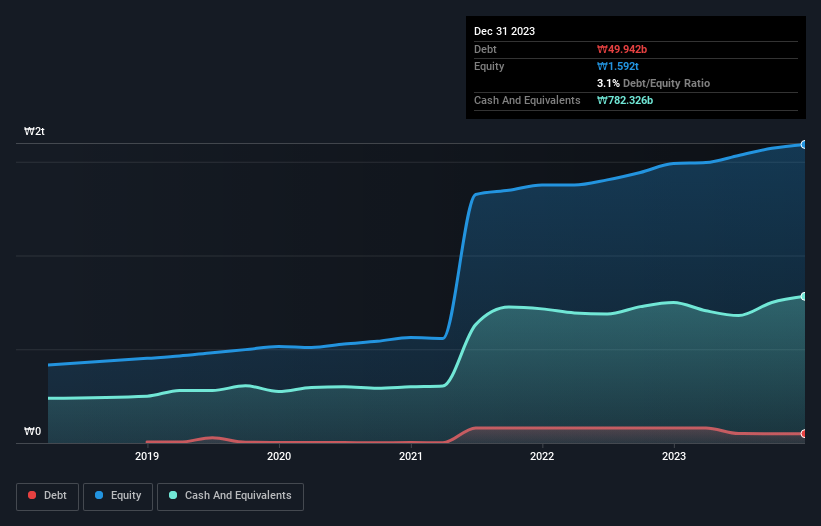Stock Analysis
- South Korea
- /
- IT
- /
- KOSE:A307950
Hyundai Autoever (KRX:307950) Could Easily Take On More Debt

Some say volatility, rather than debt, is the best way to think about risk as an investor, but Warren Buffett famously said that 'Volatility is far from synonymous with risk.' So it seems the smart money knows that debt - which is usually involved in bankruptcies - is a very important factor, when you assess how risky a company is. We note that Hyundai Autoever Corporation (KRX:307950) does have debt on its balance sheet. But the more important question is: how much risk is that debt creating?
When Is Debt A Problem?
Debt assists a business until the business has trouble paying it off, either with new capital or with free cash flow. Ultimately, if the company can't fulfill its legal obligations to repay debt, shareholders could walk away with nothing. However, a more usual (but still expensive) situation is where a company must dilute shareholders at a cheap share price simply to get debt under control. Of course, the upside of debt is that it often represents cheap capital, especially when it replaces dilution in a company with the ability to reinvest at high rates of return. When we examine debt levels, we first consider both cash and debt levels, together.
View our latest analysis for Hyundai Autoever
What Is Hyundai Autoever's Net Debt?
The image below, which you can click on for greater detail, shows that Hyundai Autoever had debt of ₩49.9b at the end of December 2023, a reduction from ₩80.2b over a year. However, it does have ₩782.3b in cash offsetting this, leading to net cash of ₩732.4b.

A Look At Hyundai Autoever's Liabilities
According to the last reported balance sheet, Hyundai Autoever had liabilities of ₩922.9b due within 12 months, and liabilities of ₩327.8b due beyond 12 months. Offsetting this, it had ₩782.3b in cash and ₩869.5b in receivables that were due within 12 months. So it actually has ₩401.1b more liquid assets than total liabilities.
This short term liquidity is a sign that Hyundai Autoever could probably pay off its debt with ease, as its balance sheet is far from stretched. Simply put, the fact that Hyundai Autoever has more cash than debt is arguably a good indication that it can manage its debt safely.
Another good sign is that Hyundai Autoever has been able to increase its EBIT by 27% in twelve months, making it easier to pay down debt. There's no doubt that we learn most about debt from the balance sheet. But it is future earnings, more than anything, that will determine Hyundai Autoever's ability to maintain a healthy balance sheet going forward. So if you're focused on the future you can check out this free report showing analyst profit forecasts.
Finally, a business needs free cash flow to pay off debt; accounting profits just don't cut it. Hyundai Autoever may have net cash on the balance sheet, but it is still interesting to look at how well the business converts its earnings before interest and tax (EBIT) to free cash flow, because that will influence both its need for, and its capacity to manage debt. During the last three years, Hyundai Autoever generated free cash flow amounting to a very robust 97% of its EBIT, more than we'd expect. That puts it in a very strong position to pay down debt.
Summing Up
While we empathize with investors who find debt concerning, you should keep in mind that Hyundai Autoever has net cash of ₩732.4b, as well as more liquid assets than liabilities. And it impressed us with free cash flow of ₩147b, being 97% of its EBIT. So is Hyundai Autoever's debt a risk? It doesn't seem so to us. Above most other metrics, we think its important to track how fast earnings per share is growing, if at all. If you've also come to that realization, you're in luck, because today you can view this interactive graph of Hyundai Autoever's earnings per share history for free.
At the end of the day, it's often better to focus on companies that are free from net debt. You can access our special list of such companies (all with a track record of profit growth). It's free.
Valuation is complex, but we're helping make it simple.
Find out whether Hyundai Autoever is potentially over or undervalued by checking out our comprehensive analysis, which includes fair value estimates, risks and warnings, dividends, insider transactions and financial health.
View the Free AnalysisHave feedback on this article? Concerned about the content? Get in touch with us directly. Alternatively, email editorial-team (at) simplywallst.com.
This article by Simply Wall St is general in nature. We provide commentary based on historical data and analyst forecasts only using an unbiased methodology and our articles are not intended to be financial advice. It does not constitute a recommendation to buy or sell any stock, and does not take account of your objectives, or your financial situation. We aim to bring you long-term focused analysis driven by fundamental data. Note that our analysis may not factor in the latest price-sensitive company announcements or qualitative material. Simply Wall St has no position in any stocks mentioned.

Simply Wall St
About KOSE:A307950
Hyundai Autoever
Hyundai Autoever Corporation provides information and communication technology services in South Korea and internationally.
Excellent balance sheet with proven track record.
